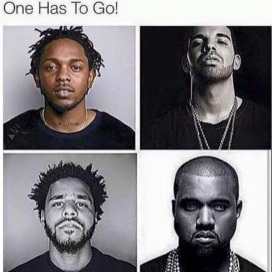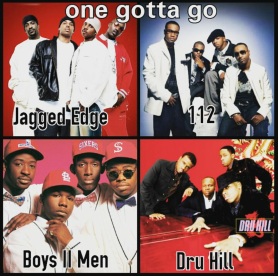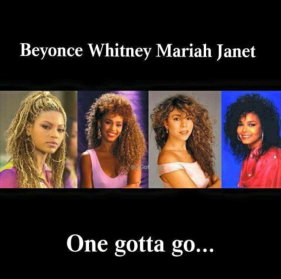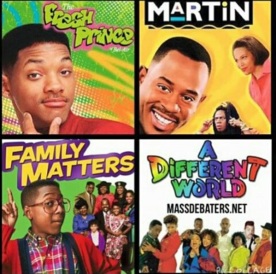Being that all of my friend and follower lists on social media are predominately black (on account of my blackness), I’m constantly bombarded with debates. Not debates about really important topics like the presidential election or the Syrian Civil War, but debates concerning issues such as these:

New-School Rappers

Classic R&B Groups

R&B Divas

Black TV Shows
Debates like these have always been a staple throughout the black community and can be easily observed through avenues such as Black Twitter, which brought them to the forefront last year when the hashtag trend “#onegottago” became popularized. Examples of #onegottago like the ones above sparked lively, and often hilarious, conversations about who or what was the best of the best.
Some are easy to decide on. Take the R&B groups above for instance. 112 should easily be the one to go. Sure, they gave us songs like “Cupid” and “Peaches & Cream,” but up against classics like “Let’s Get Married” by Jagged Edge, “End of the Road” by Boyz II Men, and Dru Hill’s entire discography (I LOVE DRU HILL. Let me go listen to “These are the Times” and “I Should Be” right quick!…okay, I’m back), 112 simply pales in comparison. Plus, Slim was an awful lead singer. He just might be the worst lead singer of all time. I guess he had “star quality,” but I don’t understand why they chose the person with the least vocal capability to sing lead. Watch their 2015 BET Awards reunion to get a taste of what I’m talking about. A mess.
On the other hand, others are harder to decide on. Take a look at the R&B divas above. All of these women are easily in my all time top ten and are probably actually my top four. But I guess if push really came to shove, Janet would have to go. But not without compromise, of course. Janet can go only as long as I’m able to keep everything from the Control, Rhythm Nation, janet., The Velvet Rope, and All For You albums. I think that’s a pretty fair deal.
But no category has been abused by #onegottago more than black TV shows (I’m aware the PC term is probably something like “sitcom featuring a predominately African-American cast,” but for the sake of this post, we’re just going to call it what it is: a black show). If you’re a reader of this blog, you know I love a good sitcom. I’m beyond sick of reality shows and dramas. A majority of the black shows that get used for #onegottago come from the 90s. The 90s were one of the golden ages of sitcoms, a time where several black shows including (but certainly not limited to) Martin, The Fresh Prince of Bel-Air, Moesha, Living Single, The Jamie Foxx Show, and The Wayans Bros. flourished. Black shows that originated in the 80s like The Cosby Show, A Different World, and Family Matters were still kicking, too. Just like with the R&B singers, it’s almost impossible to choose when it comes to black shows. They were all so good in their own ways!
A few Saturdays ago, I woke up and enjoyed a six episode marathon of Sister, Sister on TV. I found myself genuinely laughing out loud at several moments of each episode, having forgotten how funny the show was considering I haven’t watched it in forever because I was unaware that it was still in syndication anywhere. Sister, Sister is easily one of my favorite shows. I even own the first season on DVD. Being that I was born in 1994 (the same year the show originally premiered) and it ran until 1999, I have very vague memories of watching the later seasons during the late 90s. As I grew up, channels like Disney, ABC Family, and WGN ran the show in syndication where I would watch it over and over until I had eventually seen each episode numerous times. As I watched the marathon, I couldn’t help but to ask myself the question, “how come nobody cares about Sister, Sister anymore?” You rarely hear people talking about how good it was or how much they love(d) it. It’s never on one of those silly #onegottago lists. If you ask people what the best black show of the 90s was, It’ll probably end up becoming nothing but a big Martin vs. Fresh Prince debate with maybe a few other shows tossed around for consideration. I doubt Sister, Sister would be brought up, though. It’s quite simply underrated!
I mean, sure, its premise is a little off. Two Detroit twins, Tia Landry and Tamera Campbell, are separated at birth and adopted by two people who are polar opposites, sassy Lisa Landry and uptight Ray Campbell. And then bam! They magically meet up in a department store one day, find out they’re sisters, and move into Ray’s house to live as one big happy family. Maybe a tad far fetched, but I’ve seen worse. Phil of the Future’s family came from the year 2121 for goodness sake.
What was there not to love about Sister, Sister? It was all about sisterhood and girl power! Like that time the twins started their own cheerleading squad after the main squad rejected them. Or when they fought back against Tia’s boss when they found out she was making less money than one of her male coworkers. Or how Tamera goofed her way through high school, but somehow managed to pick herself up and work her way into the University of Michigan. Or how the show found a way to spotlight the WNBA, which was new at the time, when Tia accepted an internship with them at the end of the series. Overall, Sister, Sister featured two black teenage girls who had their stuff together. It represented two positive role models for girls, especially black girls, to look up to both past and present, being that a lot of the episodes are still relevant today.
It also featured a progressive black woman. We go from seeing Lisa working as an inner-city seamstress, to selling her designs on a cart at the mall (Fashions by Lisa, y’all!), to her eventually designing clothes for the likes of Patti LaBelle and Aretha Franklin by the end of the series. Now admittedly, I always felt like Lisa’s rapid climb to success was a bit of a stretch, but hey, anything could happen. It was TV after all.
It showcased a successful black man. Ray owned his own limousine business, eventually ran for Michigan State Senate in the final season, and from what we could tell, was an upstanding citizen and father. Let’s just ignore the fact that he was a Republican. (May I rant? Thank you. This is one of the major problems I have with black shows. Oftentimes, the most successful character on the show is also written as a Republican. William on ‘Girlfriends’? A Republican. Uncle Phil on ‘Fresh Prince’? A Republican. Olivia Pope on ‘Scandal’? A Republican. Stop it! There are plenty of successful black Democrats! Are you implying that black people have to sell out in order to be successful? Or maybe I’m just overreacting because I don’t trust black Republicans. That’s a different post for a different day, though).
So if Sister, Sister had all these wonderful qualities, how come it gets overlooked today? I can only come up with two reasons. The first may be that it was too squeaky clean. It may have been too much of a family friendly show. Let’s compare it to what is arguably the best black teen show of all time, Moesha. While still a comedy, Moesha dealt with a variety of issues concerning teenagers such as drug use, teen pregnancy, birth control, race relations, and the loss of a parent. Moesha had the tendency to get a bit melodramatic (I can hardly stand to watch season five with all of that Dorian-finding-out-Frank-was-his-daddy-and-not-his-uncle drama). With the exception of the times Tia got a tattoo, Tamera started shoplifting with Gabrielle Union, and when both twins started smoking with their friends, Sister, Sister was virtually free from any real drama, and when encountered with it, handled it lightheartedly. I mean, dang, even Vanessa got drunk at a party on The Cosby Show that one time. Good thing Mr. Cosby didn’t make her drink…
I think Sister, Sister’s other problem may have been that it had too narrow of a demographic. I don’t know the specifics, but as a viewer I can probably guess that the show’s intended audience was something like “females between the ages of 12 and 22.” However, there are no strict guidelines to follow when it comes to a show’s intended audience. Take Martin for instance. I grew up watching and enjoying reruns of that as a kid even though I probably didn’t understand half of the jokes back then. I did understand to laugh at characters like Sheneneh and Jerome, though. And as an adult today, I still laugh equally as hard at that mess. The point I’m trying to make is that shows like Martin are something a young girl could watch and enjoy equally as much as a grown woman or a grown man. I can’t see a 40-year-old man sitting and enjoying a Sister, Sister marathon as much as I did a few weeks ago, even though I’m totally not judging him if he did. Good TV is good TV. However, maybe Sister, Sister is just too “kiddie” for some to be considered one of the greats. Because its themes were targeted towards a younger audience, it doesn’t have the same longevity aspect that other shows have.
It’s a shame that we don’t recognize Sister, Sister more today, though. It was a feel-good show that represented blacks in a positive light that the youth of today could really benefit from watching. If anybody still cares as much as I do, Sister, Sister airs Saturdays at 10 AM CT on Up TV.
X’s and O’s
JF